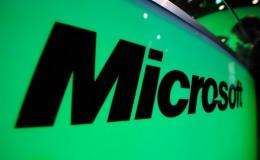Microsoft hits Motorola, Google with EU complaint

Microsoft on Wednesday lodged a formal complaint with the European Union's competition regulator against Motorola Mobility and its soon-to-be owner Google, saying Motorola's aggressive enforcement of patent rights against rivals breaks competition rules.
The complaint follows a similar step by Apple against Motorola last week.
Motorola is in the process of being taken over by Google for $12.5 billion, the biggest acquisition in the Californian company's history. Microsoft fears that Google will continue Motorola's tight hold on key patents.
Apple Inc. and Microsoft Corp. have been hit by legal cases in Europe and the United States, with Motorola claiming that the companies' products are using key patents it owns without permission.
Apple and Microsoft, meanwhile, argue that Motorola is overcharging for the use of these patents, which cover technologies necessary to connect wirelessly to the Internet or stream video online.
"We have taken this step because Motorola is attempting to block sales of Windows PCs, our Xbox game console and other products," Dave Heiner, Microsoft's deputy general counsel, wrote in a blog post.
"Motorola is on a path to use standard essential patents to kill video on the Web, and Google as its new owner doesn't seem to be willing to change course," Heiner added.
A spokesman for Google Inc. declined to comment on the complaint against Motorola. He couldn't immediately be reached after Microsoft announced its complaint also targeted Google directly.
A spokeswoman for Motorola didn't immediately respond to an emailed request for comment.
The complaints are the latest development in increasingly acrimonious disputes between global technology giants over patents on standardized technologies.
Industrywide standards play an important role not only in the technology sector. They allow products from different companies to function seamlessly together - different mobile phones or tablet computers connecting to the Internet and each other via 3-G or Wi-Fi networks, for example. Under EU competition rules, holders of patents necessary for industry standards are required to let other companies use them for a fair price.
But regulators and companies complain that holders of standard-essential patents have tried to gain an edge in the market by suing rivals over the use of their patented technologies.
When the European Commission, the EU's competition watchdog, cleared Google's takeover of Motorola earlier this month, it indicated concern over Motorola's aggressive patent enforcement. The Justice Department in its clearance of the merger made similar comments.
Separately, the Commission has already launched a formal investigation into Samsung's similar approach to patent protection and has warned that other probes may follow.
Microsoft says Motorola is demanding an unreasonable fee for using its patents, amounting to 2.25 percent of the products' total price. For a $1,000 laptop that would mean a royalty of $22.50 for using 50 patents related to a video standard. Microsoft says a group of 29 companies that hold the other 2,300 patents related to this standard charge a total of 2 cents for using them.
"If every firm priced its standard essential patents like Motorola, the cost of the patents would be greater than all the other costs combined in making PCs, tablets, smartphones and other devices," Heiner wrote. "Obviously, this would greatly increase the prices of these devices for consumers."
©2012 The Associated Press. All rights reserved. This material may not be published, broadcast, rewritten or redistributed.





















